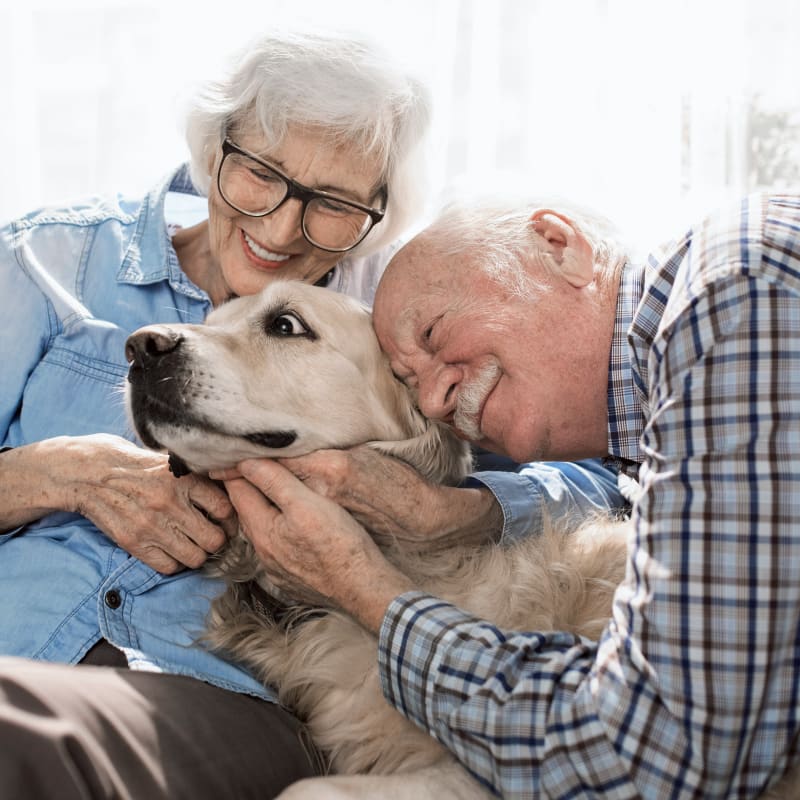Proactive Care for Your Senior Pets
When it comes to caring for senior pets we like to prioritize quality of life and early detection of disease.
Diligent care can help extend your pet's life and comfort in their senior years. They should continue to attend regular wellness exams even if they appear healthy.

Health Problems in Senior Pets
Improvements in nutrition and advances in veterinary science mean that our cherished pets are enjoying increased longevity.
While this is unquestionably a cause for celebration, pet owners and veterinarians are now faced with the challenge of managing the age-related conditions that come with advanced age.
Some of the conditions we commonly see in elderly pets include:
- Joint or Bone Disorders
Dogs
Arthritis is a very common condition, especially in older patients. We are starting to realize that by the time our pets are showing signs of arthritis, the disease process is very advanced. Addressing arthritis early on is the best way to keep our pets comfortable.
Mobility is a top concern for many pet parents and technology has come a very long way! Your pet does not have to suffer with mobility issues. Our veterinarians will discuss mobility in your senior wellness appointment and make recommendations based on what works best for your and your pet.
This checklist can also help you identify arthritis in your dog .
Cats
While osteoarthritis is typically a condition we think of in older dogs, this painful condition can also affect senior cats.
Symptoms of arthritis in cats is often more subtle than in dogs. It is estimated that over 90% of cats over 12 have arthritis. Decreased ability to jump, groom, sleeping more and urination or defecation outside of the litter box can all be signs of arthritis in cats.
Here is a survey you can take regarding feline arthritis.
- Cancer
There are many types of cancers out there and many are very treatable if caught early. Routine checkups can identify disease early allowing for early treatment.
Skin cancers are common and many can be cured. Your veterinarian will check over all the lumps and bumps you may find and advise you on the best plan to diagnose and treat any that are concerning. Aspiration (taking a needle sample) of lumps is the best way to tell if a lump is cancerous.
Bringing your senior pet in for routine checkups, even when they seem healthy allows your veterinarian to examine your dog or cat for early signs of cancer and other developing conditions, which respond better to treatment when caught in their earliest stages.
- Heart Disease
Heart disease is another common problem in our aging pets. There have been many treatment advances in this area. Listening to your pet's heart is the best way to diagnose early heart disease.
- Diabetes
Most dogs and cats that develop diabetes are older.
Symptoms of diabetes in dogs and cats may include excessive thirst, increased urination, weight loss (not just when they are obese), changes in appetite, lethargy, decreased grooming, cataracts, and/or chronic urinary infections. Bloodwork will help diagnose diabetes and a treatment plan will be formulated from there.
- Kidney Disease
Kidney disease or Renal Dysfunction is not uncommon in older pets, especially cats. Yearly bloodwork and urinalysis will screen for the early stages of this disease.
Newer innovations in veterinary prescription diets can extend the lives of these patients. Many die of other diseases years after they are diagnosed.
Veterinary Care for Older Pets
Our team will examine your senior pet and ask about its diet and lifestyle. Testing may be recommended to gain additional insight into your pet's overall health.
Recommendations may include changes to your pet's diet or exercise routine as well as medications to help your senior pet stay happy and comfortable.
Physicals For Senior Dogs & Cats
Regular examinations for senior pets provide our veterinarians with the opportunity to detect developing conditions early.
When a condition is detected early, treatment can begin when it is most manageable. Often assisting in slowing or stopping the progression of the disease.
With regular physical examinations, your pet will have the best opportunity to achieve quality long-term health.

